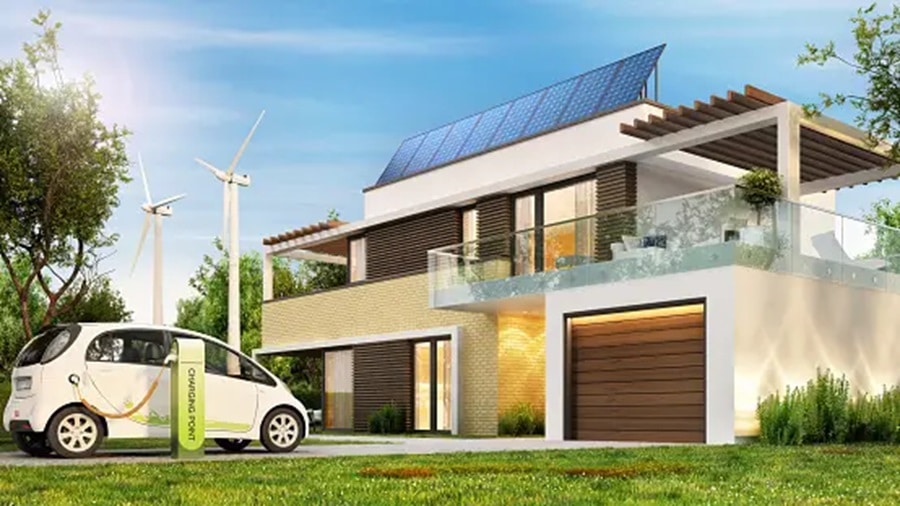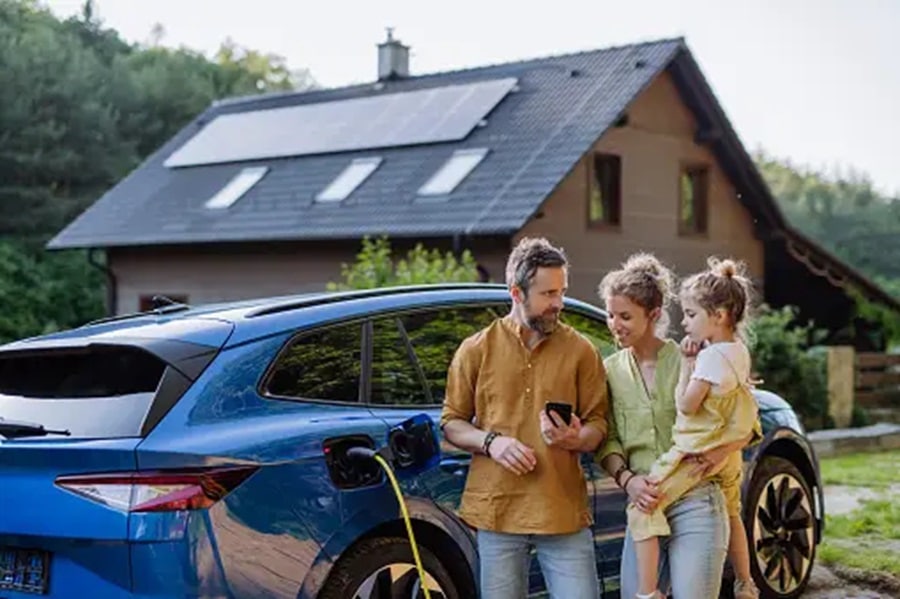Australia’s love affair with sunshine isn’t just about bronzed skin and barbecues – it’s increasingly becoming a key ingredient in powering transportation. As electric vehicles (EVs) gain traction, Aussies are looking to harness the sun’s bounty to fuel their cars, not just their holidays. This guide dives into the exciting world of charging electric cars with solar power in Australia, exploring the benefits, considerations, and equipment you need to switch to sun-powered driving.
How solar charging works
Solar charging uses solar panels to generate electricity and store it in a battery or feed it into the grid. You can use this electricity to charge your EV directly from the battery or grid solar panels.
There are two types of solar charging systems:
- Grid-connected systems are connected to the electricity network and can export excess solar power to the grid or draw power from the grid when needed.
- Off-grid systems are not connected to the network and rely solely on solar power and solar batteries to charge the EV.
The type of system you choose depends on your location, budget, and preferences. Grid-connected systems are more common and cheaper, as they do not require a large battery and can take advantage of feed-in tariffs or other incentives. Off-grid systems are more suitable for remote areas or those who want to be completely independent of the grid.

The basic components of a solar charging system are:
- Solar panels: These are the kinds of devices that use sunlight to generate DC electricity. Usually, they are installed on the carport or roof of your house or place of business. The size and number of solar panels you need depend on your energy consumption, available space, and budget.
- Solar Inverter: This solar inverter device changes the solar panels’ direct current (DC) electricity into alternating current (AC), which is then used by your electric car and other devices. Some inverters also have a built-in charger that can regulate the charging of your EV and optimise the use of solar power.
- Solar Battery: This device stores excess solar power for later use. Batteries are optional, but they can increase the self-consumption of solar power and provide backup power in case of a blackout. The size and type of battery that you need depend on your energy consumption, charging habits, and budget.
- EV charger: This device connects your EV to the solar charging system and delivers the electricity to the EV’s battery. EV chargers come in different levels of power output and features. The power output level determines how fast your EV can be charged, while the features can include smart functions such as scheduling, monitoring, and remote control.
Ready to upgrade your solar system and take your energy savings to the next level? Embrace the energy efficiency revolution by upgrading your solar panels, battery or solar inverters with Energy Matters.
Plugging in for savings: The benefits of solar EV charging
Solar charging has many benefits for EV owners, such as:
- Cost savings: By charging your EV with solar power, you can avoid paying for expensive grid electricity and reduce energy bills. Depending on your location, tariff, and usage, you can save up to 80% on your charging costs compared to grid charging. You can also earn money by exporting excess solar power to the grid or participating in demand response programs.
- Environmental benefits: You can reduce greenhouse gas emissions and environmental impact by charging your EV with solar power. Solar power is a clean and renewable energy source that does not produce harmful pollutants or waste. By combining solar power and EVs, you can achieve zero-emission transportation and contribute to a cleaner and healthier future.
- Convenience and flexibility: By charging your EV with solar power, you can enjoy the convenience and flexibility of charging at home or on the road. You can charge your EV whenever you want without worrying about finding a public charging station or paying for it. You can also choose the best time to charge your EV based on your schedule, solar production, and electricity prices.

Charging smart: Maximising your solar power
- Time your charge: Schedule your charging to coincide with peak solar production, typically midday to afternoon. Smart chargers can automate this process.
- Monitor your energy: Use energy monitoring tools to track your solar generation, consumption, and charging habits. This helps you optimise your system and maximise efficiency.
- Consider off-peak charging: If your electricity provider offers off-peak tariffs, consider charging at night to take advantage of lower rates.
Beyond the basics: Emerging technologies and future trends
- Bidirectional charging: This technology allows your EV to act as a battery, storing excess solar energy and feeding it back into the grid when needed. While still in its early stages in Australia, it holds significant potential for future energy management.
- Vehicle-to-Grid (V2G): This technology allows EVs to connect to the grid and provide power during peak demand. V2G can contribute to grid stability and potentially earn EV owners additional income.
Charging into the future: Embrace the solar-powered EV revolution
Charging your electric car with solar power is not just a trend – it’s a smart and sustainable way to embrace the future of transportation. By harnessing the sun’s power, you can reduce your environmental impact, save money on fuel, and gain greater independence. So, plug into the sunshine, hit the road, and experience the joys of a truly clean and green driving experience.
Are you ready to embrace a greener future by installing an electric vehicle (EV) charger?
Imagine the convenience of having your own charging station, allowing you to power up your EV whenever it’s convenient for you. You can contribute to a cleaner environment and combat climate change by installing an EV charger at your home or business. Energy Matters‘ trusted local installers are ready to provide you with a personalised quote tailored to your specific needs.
Don’t wait any longer; request your quote today and be part of the EV charging revolution!
Are you ready to convert your next car to an electric vehicle (EV)? Book a test drive now in one of the newest electric vehicles in your location!













































